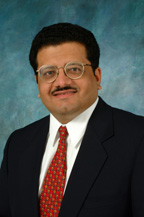UNMC/NHS is providing new hope for patients with epilepsy by building the first comprehensive program of its kind in Nebraska and the surrounding states.
Sanjay Singh, M.D., joined UNMC’s neurological sciences department in July as the state’s first trained epileptologist. He will lead the Nebraska Epilepsy Program.
A native of India, Dr. Singh received his medical degree from M.L.N Medical College in Allahabad, India, in 1993. He did his neurology residency at George Washington University in Washington, D.C., where he was chief resident, and his fellowship in epilepsy and clinical neurophysiology at Yale University in New Haven, Conn.
“We are really proud and fortunate to have Dr. Singh here,” said neurologist Pierre Fayad, M.D., chairman of neurological sciences and a graduate of Yale University. “Being an epileptologist is really a science and an art of being able to elicit information from the patient and their family, then pull it all together to get the best strategy for treatment. We’re all neurologists, but we don’t see the condition through the same eyes and skills as Dr. Singh does.”
What is epilepsy?
Epilepsy, sometimes called a seizure disorder, is a chronic medical condition produced by temporary changes in the electrical function of the brain, causing seizures that affect awareness, movement or sensation.
Increased treatment options
There are approximately 20,000 epilepsy patients in Nebraska. Of those, approximately 6,000 have intractable epilepsy, requiring specialized care. Nationally, an estimated 2.3 million people have epilepsy. The new UNMC/NHS program will elevate opportunities for people in and around Nebraska who have epilepsy, Dr. Singh said.
|
|
“Treatment depends on the type of epilepsy a patient has,” Dr. Singh said. “But, we have so many options of making their lives better.”
The new program “is a tremendous upgrade for our seizure surgery effort,” said Lyal Leibrock, M.D., professor of surgery. “We now have a full-time and exceptionally well-trained epileptologist from Yale that will help Dr. (Arun-Angelo) Patil increase the breadth and depth of structural seizure therapies in Nebraska.” Dr. Patil is a professor of surgery at UNMC.
Building the program
Dr. Singh already is seeing patients and he expects to have video monitoring equipment installed by this fall to help establish whether a patient has epilepsy and if so what kind of epilepsy, as this impacts the treatment strategy. The equipment records brain waves and monitors patients for seizures. Once a diagnosis is made, Dr. Singh can explore such treatments as medication, brain stimulation, vagus nerve stimulation or surgical removal of seizure-producing areas of the brain.
Epilepsy programs are led by a trained epileptologist, who has had two years of specialized training in epilepsy. They also include a neurosurgeon who specializes in epilepsy surgery, Advanced Brain Imaging techniques (such as PET, SPECT and special MRI techniques) and a neuropsychologist. The mainstay of an epilepsy program is the epilepsy unit where patients undergo video-EEG monitoring. By fall, UNMC/NHS will have three epilepsy units.
“Our goal is to build a state-of-the-art center that is comparable to the top centers in the country,” Dr. Singh said.